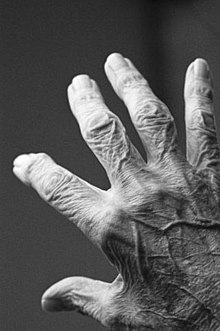Sociology of Age
This item has been on the quality assurance side of the portal sociology entered. This is done in order to bring the quality of the articles on the subject of sociology to an acceptable level. Help eliminate the shortcomings in this article and participate in the discussion . ( Enter article )
The Age Sociology (also: sociology of aging ) is a special sociology , the social situation of older people explored. Sociological findings are important for everyday life (e.g. implementation in elderly care ).
Focus
Research in the sociology of old age has increased significantly in recent years. It should provide information about the self-image and the living situation of older people and the social influences and changes to which they are exposed on a daily basis. This includes:
- Family situation (e.g. role as grandparents, effects of losing a partner)
- Work situation (e.g. lifestyle habits in retirement)
- Housing situation (e.g. alternative housing for people in need of care)
- Leisure time activities (e.g. loneliness and isolation, various activities)
In addition to the social situation, the problems of an aging society, caused by the demographic upheaval and the changed family structure, are important issues. In addition, the sociology of old age is the basis for researching and developing socio-political options to optimize the care and support of old people in society.
In addition to dealing with the problems of people who are generally considered to be "old", the sociology of old age deals with the process of getting older and with the changes in social conditions during aging in order to create concepts for the satisfaction of the Design needs of the elderly.
developments
Overall, the sociology of old age faces demanding challenges.
First , it is about the further development of a social theory of aging (Amann) .
Second - in the tension between man and society (Weede) - a canon of micro-, meso- and macro-sociological problem areas is discussed. On the background of general sociology , social structure and social policy for the age it's micro-sociological issues such as position , status , role , identity , socialization and family , mesosoziologisch to issues such as the institutional and organizational development in the elderly and elderly care as macrosociological to topics such as poverty , social inequality , social situation, lifestyles , social change , norms and values .
Thirdly , the sociology of old age is asked to act as sociological advice in the preparation of expert reports and reports on the elderly (see: Report on the elderly ) for politics ; here at different levels (local, district, state, federal and European policy). Fourth , the sociology of old age is involved in the didactic transfer of sociological knowledge for professions in geriatric care, geriatric care and aging science in specialist seminars for geriatric care - under church, public and private sponsorship -, technical colleges and universities. Scientific centers for research into the sociology of aging are the Technical University of Dortmund , the University of Kassel and the University of Vechta .
The result of research in the sociology of old age is, for example, the use of holistic care in geriatric care facilities. This care philosophy is based on the individual needs of those in need of care. Physical, psychological and social needs (e.g. contact with other people) are taken into account and included in the care.
literature
- Bernhard Jaeck : Time awareness in old age: A social psychological study on the time awareness of older people in the post-professional phase of life. Diplomica Verlag, Hamburg 2014, ISBN 978-3-8428-9065-7
- Gertrud M. Backes , Wolfgang Clemens : Age phase of life. An introduction to social science research on aging. Juventa, Weinheim / Munich 2003.
- Paul B. Baltes , Jürgen Mittelstraß (Ed.): Future of aging and social development. de Gruyter, Berlin / New York 1992.
- Silke van Dyk : Sociology of old age. transcript, Bielefeld 2015, ISBN 978-3-8376-1632-3 .
- Holger Holzschuher: 'The ceiling falls on my head' - on the experience of loneliness in old age , dissertation FU Berlin, Veronika Körner, Berlin 1984, ISBN 3-924304-01-7
- Bernhard Mann : Aging and Society. In: Sociological Review. H. 2, 2002.
- Matthias Meitzler: Sociology of Transience. Time, aging, death and remembering in a social context . Kovac, Hamburg 2011, ISBN 978-3-8300-5455-9 .
- Hans-Werner Prahl , Klaus R. Schroeter : Sociology of aging. UTB Schöningh, Paderborn 1996, ISBN 3-8252-1924-0 .
- Klaus R. Schroeter: Figurative fields. A socio-theoretical draft for care in old age. Preface by Gertrud M. Backes ( Social Gerontology Series ). Deutscher Universitätsverlag, Wiesbaden 2004, ISBN 3-8244-4598-0 .
- Rudolf Tartler : Age in Modern Society. Enke, Stuttgart 1961.
- Paegelow: Bibliography on the Sociology of Age, 2016, ISBN 978-3-00-055873-3
Web links
Individual evidence
- ↑ cf. B. Mann, 2002, p. 135

